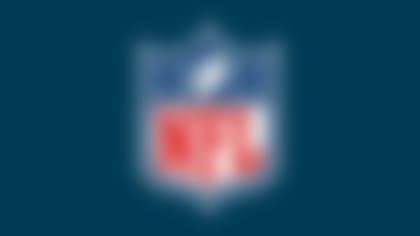It's one of the enduring arguments when football people get together: What is the ideal way to handle a prized rookie quarterback? There are two diametrically-opposed schools of thought here -- start him right away or sit him for the time being.
Matt Ryan and Andrew Luck are examples of starting by design, quarterbacks who had the starting job the day they walked in the building. There's a variation here: Joe Flacco also started as a rookie in 2008, but it was less by design than circumstance, as he was elevated only after Kyle Boller suffered a season-ending injury and backup Troy Smith had to miss Week 1 with an illness. Flacco proved he was ready, never gave up the job and went on to become a Super Bowl-winning quarterback.
In contrast to the "starting them early" approach, either by design or circumstance, is the more temperate and patient strategy of sitting them by design. Aaron Rodgers is the textbook example here and, going back a bit further, so is Steve McNair.
As it happens, all three methods -- starting by design, starting by circumstance and sitting by design -- are represented this season. Let's break down the different approaches:
1) Start by design (accelerated by circumstance): In Philadelphia, we saw Carson Wentz start the season opener for the Eagles after just a single appearance in the preseason. And while this was by design, it certainly wasn't the plan just three short weeks ago. I visited the Eagles preseason training camp in early August and spoke to Doug Pederson about the quarterback situation. He made it clear to me that they were comfortable having Wentz learn from the sidelines, at least to start the season.
That was certainly no surprise. Wentz didn't play major-college football (North Dakota State), so there was an inevitable adjustment period. And Pederson had direct experience with a similar arrangement; he'd been brought in to Philadelphia as the place-holder quarterback in 1999, to fight the good fight while then-rookie and No. 2 overall selection Donovan McNabb observed from the sidelines. Pederson started the first nine games in 1999 (going 2-7) before turning it over to McNabb, who won his first career start and finished with a 2-4 record as a rookie starter on his way to an accomplished career.
Pederson initially seemed content to follow the same timeline with Wentz this season, but then Teddy Bridgewater went down and the Vikings came calling for Eagles starter Sam Bradford. It's hard to fault Philadelphia for recouping their first-round pick and potentially more by sending Bradford packing. And it wasn't like they had no alternatives -- they'd paid solid backup Chase Daniel $21 million for a reason. But after the Bradford deal was made, Pederson pulled a 180 and -- now by design -- handed the reins to Wentz despite his limited preseason snaps and a rib injury that potentially hadn't been fully healed.
Though I had Wentz ranked as my No. 1 overall prospect in the 2016 NFL Draft, I didn't really know what to expect from him in his first career start. What I saw was Wentz adeptly executing a perfectly-designed game plan that called for multiple boots and waggles to start the game, and then -- once he was settled -- integrated some throws from within the pocket, including a dime to Jordan Matthews for his first career touchdown pass. Wentz finished the game with 22 completions on 37 attempts and two touchdowns, but more importantly, you could see the game slow down for him as he stood tall in the face of pressure. He made confident reads and stepped into his throws with real purpose.
Now, before we jump to any conclusions, let's remember he was facing a Browns defense that wasn't exactly intimidating. He has another mediocre defense albeit on the road in Chicago this week, but his true test will be how he handles Pittsburgh's wide range of blitzes and pressures in Week 3.
2) Start by circumstance: This year's version of the accidental starter -- the 2016 analog to Flacco being thrust into the starting role his rookie year -- is, of course, Dallas' Dak Prescott. Prescott was selected in the fourth round of the 2016 NFL Draft and at the time, was seen as little more than a developmental player who'd shown some raw potential -- and someone who'd demonstrated a commanding presence as the leader on his often outmanned college team. But Prescott moved up the depth chart when backup quarterback Kellen Moorebroke his leg in the first week of training camp, and then was named the starter after Tony Romosuffered yet another back injury in his only preseason action.
This is different from the Flacco situation because I don't anticipate that Prescott will maintain the starting duties upon Romo's return (the people forecasting otherwise are either deluded about Prescott's short-term potential or simply fatigued with the ongoing injury saga of the hard-luck Romo). But that's not to say that Prescott hasn't opened some eyes or that he isn't the likely heir to Romo down the line. He had maybe the most impressive preseason for a rookie quarterback in recent memory -- leading the league's rookies in completion percentage, passing touchdowns and passer rating. On Sunday, against a bitter division rival, Prescott wasn't flawless, but he certainly proved that the game wasn't too big for him.
However, two things clearly must change for the Cowboys as they move forward with Prescott under center. They simply don't want him to throw it 45 times as he did last week -- especially in a game that never turned into a shootout. For most quarterbacks, the ideal pitch count is around 30; you don't want to go much above that, especially when you've got a rookie quarterback, a tight game and Ezekiel Elliott carrying the rock for you. When Prescott does throw it, he needs to generate more explosive plays down the field. The Cowboys had just one single play against the Giantsthat gained more than 20 yards, a completion to backup tight end Geoff Swaim. As I've said many times before: In today's NFL, just winning the turnover battle (the Cowboys were plus-1) isn't enough; you must create explosive plays as well, and one per game just simply isn't going to cut it.
3) Sit by design: This worked ideally for Rodgers -- who learned from Hall of Fame quarterback Brett Favre in Green Bay. But Rams' No. 1 overall pick Jared Goff is sitting behind Case Keenum and Sean Mannion, who have five total wins during their combined six seasons in the NFL (Goff could be elevated to No. 2 on the depth chart, before this week's game). Monday night, Goff became the first QB taken No. 1 overall in the draft to not start his team's season debut since JaMarcus Russell in 2007. (Russell had held out all of training camp and even into the first week of the season, and remained unsigned until Sept. 12, four days prior to the second game of the season.) That year, Russell didn't earn his first start until the final game of his rookie year, and we all know how the rest of that story played out. I'm certainly not predicting a similar ending for Goff, but anytime you are a young quarterback and mentioned in the same sentence as JaMarcus Russell, it's usually not a good thing.
Paxton Lynch also falls into the sit-by-design category, losing out on the starting job to a list of unproven quarterbacks in Denver. With Mark Sanchez cut and now moving to the backup role in Dallas, Lynch will serve as the backup to Trevor Siemian until further notice.
Of the two, I expect we will see Goff much sooner, simply because Denver is a sounder overall team with realistic playoff aspirations. One or two more performances like Keenum's on Monday night in San Francisco will have fans screaming for Goff. (A slow start will also put Jeff Fisher in the position of needing to get the rookie into the lineup to preserve his own job.)
While we are obviously years away from knowing how all these situations play out, I am on record that as a coach, particularly in the win-now environment of the NFL, half-measures usually don't get it done. Unless you have a truly promising alternative (by which I mean someone other than Keenum), you almost have to start your rookie quarterbacks, especially the ones drafted in the first round -- if for no other reason than to find out what you have or in about 50 percent of the cases, don't have. The Eagles and Cowboys are finding out; the Rams and Broncos have chosen to wait.




